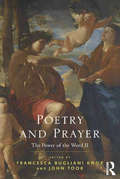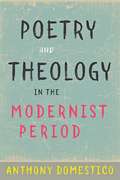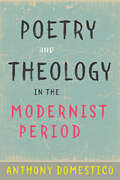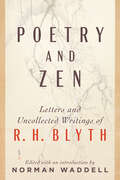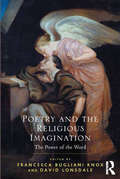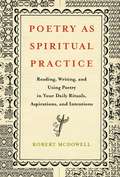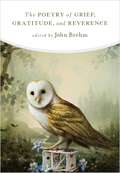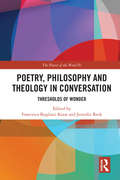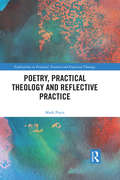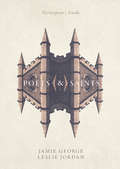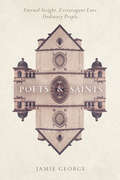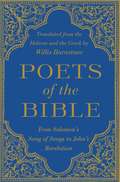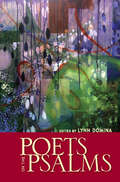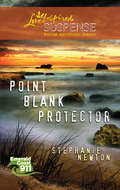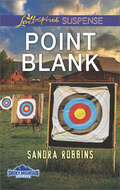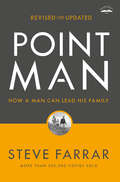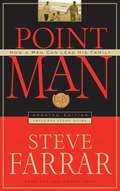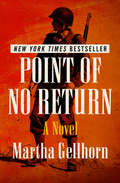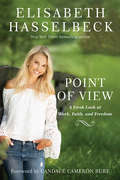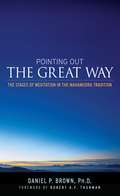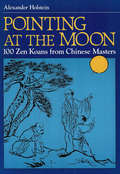- Table View
- List View
Poetry Will Save Your Life: A Memoir
by Jill BialoskyAn unconventional and inventive coming-of-age memoir organized around forty-three remarkable poems by poets such as Robert Frost, Emily Dickinson, Wallace Stevens and Sylvia Plath, from a critically acclaimed New York Times bestselling author and poet.For Jill Bialosky, certain poems stand out like signposts at pivotal moments in a life: the death of a father, adolescence, first love, leaving home, the suicide of a sister, marriage, the birth of a child, the day in New York City the Twin Towers fell. As Bialosky narrates these moments, she illuminates the ways in which particular poems offered insight, compassion, and connection, and shows how poetry can be a blueprint for living. In Poetry Will Save Your Life, Bialosky recalls when she encountered each formative poem, and how its importance and meaning evolved over time, allowing new insights and perceptions to emerge. While Bialosky’s personal stories animate each poem, they touch on many universal experiences, from the awkwardness of girlhood, to crises of faith and identity, from braving a new life in a foreign city to enduring the loss of a loved one, from becoming a parent to growing creatively as a poet and artist. In Poetry Will Save Your Life, Bialosky has crafted an engaging and entirely original examination of a life while celebrating the enduring value of poetry, not as a purely cerebral activity, but as a means of conveying personal experience and as a source of comfort and intimacy. In doing so she brilliantly illustrates the ways in which poetry can be an integral part of life itself and can, in fact, save your life.
Poetry and Prayer: The Power of the Word II (The Power of the Word)
by Francesca Bugliani Knox John TookInterdisciplinary and ecumenical in scope, Poetry and Prayer offers theoretical discussion on the profound connection between poetic inspiration and prayer as well as reflection on the work of individual writers and the traditions within which they stand. An international range of established and new scholars in literary studies and theology offer unique contributions to the neglected study of poetry in relation to prayer. Part I addresses the relationship of prayer and poetry. Parts II and III consider these and related ideas from the point of view of their implementation in a range of different authors and traditions, offering case studies from, for example, the Bible, Dante, Shakespeare and Herbert, as well as twentieth-century poets such as Thomas Merton, Denise Levertov, W.H. Auden and R.S. Thomas.
Poetry and Theology in the Modernist Period
by Anthony DomesticoIn this book, Domestico reveals how an important strand of modern poetry actually understood itself in and through the central theological questions of the modernist era: What is transcendence, and how can we think and write about it? What is the sacramental act, and how does its wedding of the immanent and the transcendent inform the poetic act? How can we relate kairos (holy time) to chronos (clock time)? Seeking answers to these complex questions, Domestico examines both modernist institutions (the Criterion) and specific works of modern poetry (Eliot’s Four Quartets and Jones’s The Anathemata). The book also traces the contours of what it dubs "theological modernism": a body of poetry that is both theological and modernist. In doing so, this book offers a new literary history of the modernist period, one that attends both to the material circulation of texts and to the broader intellectual currents of the time.
Poetry and Theology in the Modernist Period
by Anthony DomesticoWhat if the religious themes and allusions in modernist poetry are not just metaphors?Following the religious turn in other disciplines, literary critics have emphasized how modernists like Woolf and Joyce were haunted by Christianity’s cultural traces despite their own lack of belief. In Poetry and Theology in the Modernist Period, Anthony Domestico takes a different tack, arguing that modern poets such as T. S. Eliot, W. H. Auden, and David Jones were interested not just in the aesthetic or social implications of religious experience but also in the philosophically rigorous, dogmatic vision put forward by contemporary theology. These poets took seriously the truth claims of Christian theology: for them, religion involved intellectual and emotional assent, doctrinal articulation, and ritual practice. Domestico reveals how an important strand of modern poetry actually understood itself in and through the central theological questions of the modernist era: What is transcendence, and how can we think and write about it? What is the sacramental act, and how does its wedding of the immanent and the transcendent inform the poetic act? How can we relate kairos (holy time) to chronos (clock time)? Seeking answers to these complex questions, Domestico examines both modernist institutions (the Criterion) and specific works of modern poetry (Eliot’s Four Quartets and Jones’s The Anathemata). The book also traces the contours of what it dubs "theological modernism": a body of poetry that is both theological and modernist. In doing so, this book offers a new literary history of the modernist period, one that attends both to the material circulation of texts and to the broader intellectual currents of the time.
Poetry and Zen: Letters and Uncollected Writings of R. H. Blyth
by R. H. BlythNever before published letters and uncollected short writings of R. H. Blyth, champion of Zen and the person who brought haiku to the world.Poetry and Zen assembles a remarkable literary feast: the letters, articles, translations, reviews, and selections from the papers of Reginald Horace Blyth (1898–1964). Following on the landmark success of Zen in English Literature and Oriental Classics (1942), Blyth&’s voluminous writings on Zen, Japanese culture, and the Japanese verse forms haiku and senryū captured the imagination of English-speaking readers in the decades following World War II. His enlightening wit and inimitable style struck a particularly sensitive chord in the artistic community, providing inspiration to many poets and writers and helping to kindle global interest in Zen and haiku.Blyth&’s penetrating insights on these topics in a series of books published between 1942 and 1970 helped lay the foundation for the remarkable expansion of Zen outside of East Asia, as well as the popularization of haiku as an international verse form that took place after his death. Poetry and Zen is the first collection of Blyth&’s letters and short writings. The generous array of Blyth&‘s literary output and personal writing on display here showcases the wide-ranging interests and brilliant mind of a pivotal figure in the history of modern Zen and Japanese poetry.
Poetry and the Religious Imagination: The Power of the Word (The Power of the Word)
by David Lonsdale Francesca Bugliani KnoxWhat is the role of spiritual experience in poetry? What are the marks of a religious imagination? How close can the secular and the religious be brought together? How do poetic imagination and religious beliefs interact? Exploring such questions through the concept of the religious imagination, this book integrates interdisciplinary research in the area of poetry on the one hand, and theology, philosophy and Christian spirituality on the other. Established theologians, philosophers, literary critics and creative writers explain, by way of contemporary and historical examples, the primary role of the religious imagination in the writing as well as in the reading of poetry.
Poetry as Spiritual Practice
by Robert Mcdowell"[When we read and write poetry,] it is as if a long-settled cloud in our mind suddenly dissipates, and we are divine once again." -- from the Introduction Poetry is the language of devotion in prayer, chant, and song. Reading and writing poetry creates clarity, deepens and expands spiritual inquiry, and cultivates wisdom, compassion, self-confidence, patience, and love. In author Robert McDowell's words, poetry makes you into a tuning fork of the Divine. But poetry has disappeared over the centuries from religious ceremonies, academic curricula, and public discourse. In Poetry as Spiritual Practice, the first inspirational and instructional guide to combine poetry and spirituality, McDowell restores poetry as the natural language of spiritual practice and invites you to recognize poetry as "the pure sound and shape of your spirit." Vividly illustrated with a wide range of poems from all historical eras and poetic traditions, numerous religions and faiths, and McDowell's own and his students' work, Poetry as Spiritual Practice will reintroduce you to the unique pleasure of verse. And meditations throughout will allow you to integrate reading and writing poetry into your spiritual journeys and daily life. Since many of us have long forgotten, or never learned, the mechanics and terminology of poetry -- trochaic feet and tropes trip us up; we can't tell a villanelle from its shorter cousin, rondeau; and a terza rima may as well be a tanka -- this is also an instructional handbook on reading and writing poetry. An engaging guide through the landscape of world poetry, McDowell argues along the way for the many practical benefits of poetic literacy. Making poetry an essential part of daily rituals, aspirations, and intentions will put you on the path to greater meaning, growth, and peace in your life. At once an engaging technical primer, a profound meditation on the relationship between poetry and the Divine, and an inspirational guide for integrating poetry into spiritual practice, Poetry as Spiritual Practice will become a cherished companion.
Poetry of Grief, Gratitude, and Reverence
by John BrehmA new anthology from the editor of the bestselling Poetry of Impermanence, Mindfulness, and Joy.Explorations on a journey through the darkest and brightest moments of our lives, the poems gathered here are explorations of loss, of thanksgiving, of transformation. Some show a path forward and others simply acknowledge and empathize with where we are, but all are celebrations of poetry&’s ability to express what seemed otherwise inexpressible, to touch deep inside our hearts—and also pull ourselves out of our selves and into greater connection with the world around us. Includes poems by Rainer Maria Rilke, Robert Frost, Elizabeth Bishop, Czeslaw Milosz, Seamus Heaney, Billy Collins, Joy Harjo, Danusha Lameris, Ada Limon, Kevin Young, Arthur Sze, Ellen Bass, Li Young-Lee, Natasha Tretheway, and many more. The editor also includes an essay on appreciative attention and links to guided meditations for select poems, offering us a chance to have an even deeper experience of reflection.
Poetry, Philosophy and Theology in Conversation: Thresholds of Wonder: The Power of the Word IV
by Jennifer Reek Francesca Bugliani KnoxThis volume is a collection of essays that explains how literature, philosophy and theology have explored the role of wonder in our lives, particularly through poetry. Wonder has been an object of fascination for these disciplines from the Greek antiquity onwards, yet the connections between their views on the subject are often ignored in subject specific studies. The book is divided into three parts: Part I opens the conversation on wonder in philosophy, Part II is given to theology and Part III to literary perspectives. An international set of contributors, including poets as well as scholars, have produced a study that looks beyond traditional chronological, geographical and disciplinary boundaries, both within the individual essays themselves and in respect to one another. The volume’s wide historical framework is punctuated by four poems by contemporary poets on the theme of wonder. An unconventional foray into one of the best-known themes of the European tradition, this book will be of great interest to scholars of literature, theology and philosophy.
Poetry, Practical Theology and Reflective Practice (Explorations in Practical, Pastoral and Empirical Theology)
by Mark PryceThis groundbreaking study offers an innovative critical analysis of poetry as a resource for reflective practice in the context of continuing professional development. In the contemporary drive in all professions for greater rigour in education, training, and development, little attention is paid to the inner shape of learning and meaning-making for individuals and groups, especially ways in which individuals are formed for the task of their work. Building on empirical research into the author’s professional practice, the book takes the use of poetry in clergy continuing ministerial development as a case-study to examine the value of poetry in professional learning. Setting out the advantages and limitations of poetry as a stimulant for imaginative, critical reflexivity, and formation within professional reflective practice, the study develops a practical model for group reflection around poetry, distilling pedagogical approaches for working effectively with poetry in continuing professional development. Drawing together a number of strands of thinking about poetry, Practical Theology, and reflective practice into a tightly argued study, the book is an important methodological resource. It makes available a range of primary and secondary sources, offering researchers into professional practice a model of ethnographic research in Practical Theology which embraces innovative methods for reflexivity and theological reflection, including the value of auto-ethnographic poetry.
Poets and Saints Participant's Guide
by Leslie Jordan Jamie GeorgeThis immersive seven-week experience uses the intentional conversations of the Poets and Saints DVD as a springboard for further reflection and discussion. Exploring the spiritual lives of Christians such as Saint Francis of Assisi and George MacDonald, and featuring photography and artwork reflective of their lives and experiences, Poets and Saints Participant's Guide challenges readers to grow in their own faith as they immerse themselves in the remarkable lives of those who have gone before them.
Poets and Saints: Eternal Insight. Extravagant Love. Ordinary People.
by Jamie GeorgeOne of the most beautiful ways to know God better is to learn from those who served Him in other times and cultures. The poets and saints of Christian history were imperfect, yet they offer wisdom across the centuries that is as powerful today as it was to their contemporaries. In Poets and Saints, Jamie George takes readers from a pub in Oxford, to a cathedral in the Italian hills, to a rooftop in Switzerland, and beyond as he offers insight into the minds and hearts of Christians such as John Newton, C. S. Lewis, and Saint Therese.
Poets of the Bible: From Solomon's Song of Songs to John's Revelation
by Willis Barnstone“The vividness and beauty of the language emerge in a fresh way . . . with evocative simplicity.” —Robert Alter, professor emeritus of Hebrew and comparative literature, University of California, Berkeley The world’s greatest poetry resides in the Bible, yet these major poets are traditionally rendered into prose. In this pioneering volume of biblical poets translated in English, Willis Barnstone restores the lyricism and power of the poets’ voices in both the New and Old Testaments. In the Hebrew Bible we hear Solomon rhapsodize in Song of Songs, David chant in Psalms, God and Job debate in grand rhetoric, and prophet poet Isaiah plead for peace. Jesus speaks in wisdom verse in the Gospel, Paul is a philosopher of love, and John of Patmos roars majestically in Revelation, the Bible’s epic poem. This groundbreaking volume includes every major biblical poem from Genesis and Adam and Eve in the Garden to the last pages of Alpha and Omega in Paradise.
Poets on the Psalms
by Lynn DominaReverential, celebratory, antagonistic, and even erotic, this remarkable collection of essays interprets the Psalms as a collection of poetry. Written by 14 acclaimed poets, the essays approach the Psalms from a personal, often autobiographical perspective, demonstrating how relevant they remain for today's readers. Alicia Ostriker examines the Psalms' glory and their terror in a moving essay that revels in their moods of joy while acknowledging the brutality they invoke, linking their violence to events such as 9/11, the Palestinian uprisings, and the Rwandan massacres. Weaving autobiographical anecdotes with scholarly introspection, Enid Dame provides a Jewish explanation of Psalm 22, while editor Lynn Domina contemplates the pastoral life as she connects the everyday with phrases from the Psalms. From a former nun to a self-described left-wing Jew, from a Midrashic scholar to a Texas rancher, the contributors mirror the wide swath of humanity interested in, and affected by, the Psalms.
Poets on the Psalms
by Lynn DominaReverential, celebratory, antagonistic, and even erotic, this remarkable collection of essays interprets the Psalms as a collection of poetry. Written by 14 acclaimed poets, the essays approach the Psalms from a personal, often autobiographical perspective, demonstrating how relevant they remain for today's readers. Alicia Ostriker examines the Psalms' glory and their terror in a moving essay that revels in their moods of joy while acknowledging the brutality they invoke, linking their violence to events such as 9/11, the Palestinian uprisings, and the Rwandan massacres. Weaving autobiographical anecdotes with scholarly introspection, Enid Dame provides a Jewish explanation of Psalm 22, while editor Lynn Domina contemplates the pastoral life as she connects the everyday with phrases from the Psalms. From a former nun to a self-described left-wing Jew, from a Midrashic scholar to a Texas rancher, the contributors mirror the wide swath of humanity interested in, and affected by, the Psalms.
Point Blank
by Mark A. RempelAll Seth Anderson wanted to do was to graduate. Point Blank takes us into the final weeks of his senior year as Seth finishes his last assignment-a project for his philosophy class exploring the question, "What is the meaning of life?" Suddenly Seth finds himself in the middle of the worst school shooting in the history of America and forced to find meaning for his own life, while staring point blank at the barrel of a gun. What would you say if a gun was pointed at your head, Point Blank?
Point Blank
by Mark RempelAll Seth Anderson wanted to do was to graduate. Point Blank takes us into the final weeks of his senior year as Seth finishes his last assignment-a project for his philosophy class exploring the question, "What is the meaning of life?" Suddenly Seth finds himself in the middle of the worst school shooting in the history of America and forced to find meaning for his own life, while staring point blank at the barrel of a gun. What would you say if a gun was pointed at your head, Point Blank?
Point Blank Protector
by Stephanie NewtonWith his cover blown, former DEA Agent Tyler Clark has nothing but time on his hands. Time-and orders-to see the police psychologist before taking a new case. Gracie VanDoren's cheerful determination to help him drives Tyler up the wall. . . ;right up until a threatening letter has Gracie's sunshiny demeanor giving way to fear. As the threats escalate, both realize someone has an unusually personal vendetta against Gracie. Now Tyler's cover is blown again. Because he's committed to being her point-blank protector-even if it means exposing his heart.
Point Blank: Smoky Mountain Secrets (Smoky Mountain Secrets)
by Sandra RobbinsIn this inspirational romance, when a competitive archer becomes the target of an assassin, she joins forces with the local sheriff to find her stalker.For archery expert Hannah Riley and her daughter, nowhere on her Smoky Mountain ranch is safe with someone aiming to kill her. She’s not sure why they want her dead, but with the help of her best friend, Sheriff Ben Whitman, she won’t give up until she knows—and stops them. Hannah’s comeback in competitive mounted archery is looming, though, and time is running out to uncover the truth. Years ago Ben promised Hannah’s late husband he’d watch over her. But guarding her proves even more dangerous to Ben’s heart when the lawman is forced to confront his growing feelings for Hannah. He can’t lose another woman he loves . . . but if Ben wants to save the single mother and her little girl, every move he makes must be on target.
Point Man, Revised and Updated: How a Man Can Lead His Family
by Steve FarrarThe bestselling guide for Christian men who want to lead their families well is now revised and updated to help fathers and husbands navigate the complexities of today&’s challenges. &“Jam-packed with biblical direction and leadership strategies, this battle guide will equip you to lead your family to victory.&”—Dr. Tony Evans, president of the Urban Alternative and senior pastor of Oak Cliff Bible FellowshipMost men want to be strong spiritual leaders of their families. They just don&’t know how because they&’ve never seen it modeled.That&’s why Steve Farrar wrote Point Man thirty years ago. With more than half a million copies sold, it&’s the go-to resource for how to faithfully lead and love your family, walk boldly through challenging seasons of marriage and parenting, stand firm against personal temptation, and forge a faith that shines bright. Yet the war on the family has only intensified since this trusted guide first came out. Whether through entertainment, social media, or legislation, our world seems determined to undermine the traditional family—which means faithful spiritual leadership is needed more than ever. This revised and updated edition will equip you to confidently navigate the cultural and societal forces affecting your family, such as: • shifting views of masculinity and femininity• the declining influence of church and faith• fractured perspectives on morality Packed with powerful inspiration, clear biblical direction, and contemporary examples, Point Man provides the strategies you need to lead your family safely through today&’s battles and on to victory.
Point Man: How a Man Can Lead His Family
by Steve FarrarThis bestselling classic encourages and equips Christian men to lead their families successfully through hazards and ambushes like divorce, promiscuity, suicide, and drug addiction. Men will find practical insight on topics such as a father's influence, maintaining purity, and husband-and-wife teamwork. In this war, renowned men's author Steve Farrar emphasizes, Jesus Christ is looking for men who will not die, but live for their families.From the Trade Paperback edition.
Point of No Return: A Novel
by Martha GellhornA US soldier confronts the horrors of the Holocaust in this New York Times–bestselling novel from acclaimed WWII correspondent Martha Gellhorn. Growing up in St. Louis, Missouri, Jacob Levy is a typical American boy. He never gives much thought to world affairs—or to his Jewish heritage. But when the United States joins the Allied effort to stop Hitler, Jacob&’s life and sense of identity are on course to change forever. As a soldier in the last months of World War II, Jacob lives through the Battle of the Bulge and the discovery of Nazi concentration camps. Witnessing the liberation of Dachau, he confronts a level of cruelty beyond his own imaginings, and the shock transforms him in ways he never thought possible. One of the first female war correspondents of the twentieth century, Martha Gellhorn visited Dachau a week after its discovery by American soldiers. A New York Times bestseller when it was first published, this powerful novel grapples with the horrors of war and dilemmas of moral responsibility that are just as relevant today. This ebook features an afterword by the author.
Point of View: A Fresh Look at Work, Faith, and Freedom
by Elisabeth Hasselbeck Candace Cameron BureRecognized from her roles on Survivor, The View, and FOX & Friends, celebrity Elisabeth Hasselbeck presents a deeply intimate journey of faith, told through the important moments in her life."Point of view," by definition, is a particular attitude or way of considering a matter. Through her nearly two decades of broadcasting, Elisabeth learned the necessity of extracting the point of view of the person being interviewed on a particular topic or subject or experience. Doing so allows you to see issues and truths through another's eyes. It requires a shift in perspective to see the story through their lens. In this illuminating book, Elisabeth walks through the times--from her national celebrity days to her newest role as CBO (Chief Breakfast Officer)--where she saw something differently than how God wanted her to, and the path back to His point of view was sometimes rocky but always revealing. Sometimes God's intentions for her were clear, yet other times she encountered situations so uncomfortable and blurry that she could only ask for His wisdom. In this book, Elisabeth welcomes you into the many different, and often divergent, points of view that she has witnessed and learned from along the way. It is a journey that brought her to the ultimate point of view that she discovered in the Word of God--that until she sees herself as He sees her, she is not seeing at all. As you read through the pages here, she invites you to make the same discovery for yourself.
Pointing Out the Great Way
by Robert Thurman Daniel P. BrownMany books have been published in recent years on the topic of mahamudra, or meditation on the fundamentally clear nature of the mind. This book is different in the systematic way it draws from a variety of source texts in order to construct a complete, graded path of practice informed by an understanding of the particular obstacles faced by meditators in the West. Dan Brown is a clinical psychotherapist who has also spent much time evaluating the experiences of meditators on longterm retreats. He knows the Tibetan literature on mahamudra meditation and has over thirty years of both personal meditation experience and observation of the experiences of others. He co-wrote, with Ken Wilber and Jack Engler, the book Transformations in Consciousness, and he teaches an annual seminar on mahamudra meditation at the Esalen Institute. Pointing Out the Great Way is a spiritual manual that describes the Tibetan Buddhist meditation known as mahamudra from the perspective of the 'gradual path.' The gradual path is a progressive process of training that is often contrasted to sudden realization. As such, this book contains a step-by-step description of the ways to practice, precise descriptions of the various stages and their intended realizations, and the typical problems that arise along with their remedies. Simply put, mahamudra meditation involves penetrative focus, free of conceptual elaboration, upon the very nature of conscious awareness. A unique feature of this book is its integrative approach to the stages of mahamudra meditation. A number of works on Buddhist meditation stages in general and mahamudra meditation in particular are already available in English, yet none, single text or commentary on the stages of mahamudra meditation, captures the inner experience of these stages in sufficient detail to convey its richness. This book represents the needed alternative by integrating material from a variety of root texts, practical manuals,
Pointing at the Moon
by Alexander HolsteinPointing at the Moon comprises one hundred brilliant examples of the Ch'an masters' questions and answers from the following four treatises of the Ch' an tradition: A Selection From the Five Books of the Ch 'an Masters' Sayings, The Light of the Ch 'an Sayings Recorded in the Year if Developing Virtue (A.D. 1004), The Ch'an Sayings Recorded During the Moonlit Meditation, and An Anthology if Ch'an Sayings,

